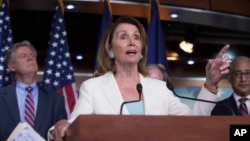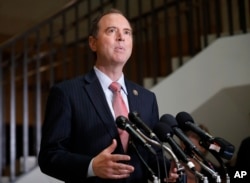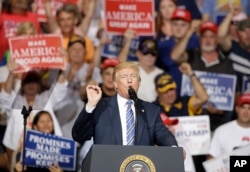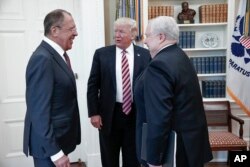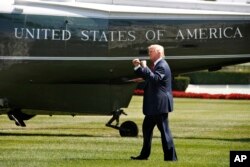There is apparent discord within the U.S. Democratic Party over how vigorously it should emphasize allegations of collusion between Donald Trump's presidential campaign and Russia, according to Politico.
Democratic candidates and political operatives expressed concern to Politico that maintaining the Russia controversy as a primary issue, instead of health care and other pocketbook issues, could backfire.
Veteran Democratic consultant Bill Burton, who is involved in several political campaigns, told Politico voters are "mostly sick of hearing about it, and they want to hear politicians talk about things that are more directly important to their lives."
Sharpened focus
Darry Sragow, a Democratic strategist in the western state of California, predicted Democratic candidates are "going to be in deep, deep trouble" if they don't address more relevant issues.
"The more we talk about stuff that voters don't truly care about in their daily lives... it confirms that the Democratic Party's brain has been eaten by the elites in Washington who have been sitting fat and happy for a lot of years while working Americans have lost their jobs and lost confidence in the future," Sragow told Politico.
Democratic congressional candidate Hans Keirstead, who is challenging Republican Dana Rohrabacher in California, told Politico that Russia "is not the story... it's an opener."
Nevertheless, the Russia controversy remains a hot button issue for many Democrats, prompting sharp reactions from Republican lawmakers. House Intelligence Committee Chairman Devin Nunes has advised politicians to "stop chasing Russian ghosts around the closet," and Senator Rand Paul labeled the probe last month a "witch hunt."
In an attempt to win back working class voters that were lost to Trump in the November election, Democrats last month unveiled their new agenda. Called "The Better Deal," the agenda includes proposals on issues such as job creation and prescription drug prices.
In addition to several congressional probes, the Federal Bureau of Investigation (FBI) is investigating the possibility of collusion in an effort to influence the 2016 election in Trump's favor. Trump has consistently denied any collusion and has also called the FBI probe “a witch hunt.”
Recent polls indicate voters are very leery of Trump's ties to Russia, but also weary of the ongoing FBI investigation.
A Quinnipiac University Poll released this week found 63 percent of American voters feel Russia meddled in the election. But a majority of voters in the Politico/Morning Consult poll felt Congress should not try to impeach the president. A Harvard-Harris Poll found almost two-thirds of voters believe the probes are impairing the economy.
Kislyak-Flynn conversations
Meanwhile, a key figure in the Russia probes, former Russian ambassador to Washington Sergei Kislyak, said Saturday that discussions with former White House national security advisor Michael Flynn had been transparent and limited to matters of U.S.-Russia cooperation.
Flynn was forced to quit in February after it became known he failed to disclose the content of their discussions and for misleading U.S. Vice President Mike Pence about their meetings.
In a White House statement issued Friday, National Security Advisor H.R. McMaster, who fired Flynn protege and intelligence advisor Ezra Cohen-Watnick, received the president's stamp of approval.
"General McMaster and I are working very well together," Trump said. McMaster's firing of Cohen-Watnick sparked criticism from right-wing critics that McMaster is trying to remove conservatives from the White House national security team.
Trump is at his golf club in the northeastern town of Bedminister, New Jersey, where he arrived Friday to begin a summer vacation. The White House said the 17-day break will be a working vacation that was necessitated by an upgrade to the heating and air conditioning systems in the West Wing of the White House.
"The president is going to continue to work," deputy press secretary Lindsay Walters told reporters.
In addition to insisting that Congress delay its vacation until it passed a new health care bill, Trump frequently criticized President Barack Obama for taking vacations and playing golf.




